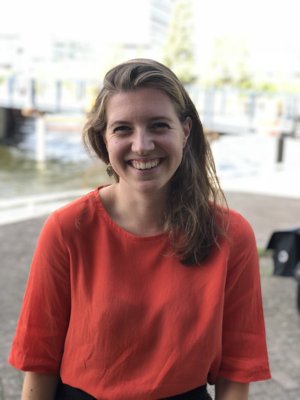In September last year, 4TU.CEE PhD candidate Nina Bohm received a ‘go’ for her PhD research proposal. In her research she looks into how universities and cities are creating new spaces for students to learn in collaboration with the real-world. Focal point of the research is the Living Lab course of the joint degree MSc MADE run at AMS Institute.
 “Universities in the 21st century are under societal pressure to re-establish their role as knowledge producing and knowledge sharing institution and to re-invent the relation that higher education seeks with societal challenges”, says Bohm. Many of the major challenges in society today will demand a different way of working and therefore a different kind of education in the future. The challenges of sustainability and the need for technologies that are increasingly permeating the public domain are of such complexity that specifically the role of the engineer is changing to meet these new demands. Bohm: ”Future engineers no longer have a single task to interact with technology, but they will have to work as mediators between technology and actors in the public domain”. Consequently, it is of great importance for universities of technology to look into ways for students in higher education to interact with these challenges in order to attain transdisciplinary competences, meaning competences that allow them to seek engagement with both science and society in their further professional development.
“Universities in the 21st century are under societal pressure to re-establish their role as knowledge producing and knowledge sharing institution and to re-invent the relation that higher education seeks with societal challenges”, says Bohm. Many of the major challenges in society today will demand a different way of working and therefore a different kind of education in the future. The challenges of sustainability and the need for technologies that are increasingly permeating the public domain are of such complexity that specifically the role of the engineer is changing to meet these new demands. Bohm: ”Future engineers no longer have a single task to interact with technology, but they will have to work as mediators between technology and actors in the public domain”. Consequently, it is of great importance for universities of technology to look into ways for students in higher education to interact with these challenges in order to attain transdisciplinary competences, meaning competences that allow them to seek engagement with both science and society in their further professional development.
Discovering new ways to connect science and society
The engagement of higher education with real-life challenges is increasingly visible in the collaboration that universities seek with cities and vice versa. In an urbanising world, the city is an accumulation of the most challenging societal issues. Also, it is an indispensable knowledge network that forms as breeding ground for ideas, innovations and knowledge development. In order to use the advantages of the city to their full potential, universities create physical spaces for educational innovation with the city and discover new ways of delivering their core tasks in society.
In the Netherlands, transdisciplinary ambitions in higher education are part of all recent organizational strategies for universities of technology. “The challenge that these knowledge institutes have formulated for themselves is to find a further engaged position in the contemporary society and translate this engagement to the uncompromising practice of higher education. The question is how to do that”, says Bohm.
Fostering deeper understanding
“This research aims to contribute to a deeper understanding of the learning processes that are facilitated in innovative education initiatives that arise from collaborations between university and city”, explains Bohm. These collaborations are governmentally incentivized and growing rapidly all over the Netherlands, creating a learning environment for students to interact with practitioners and challenges in the city. Bohm feels there is a scientific responsibility to share what is learned in these educational experiments and to reflect critically on their impact in order for them to advance transdisciplinary higher education in the future. She is thrilled to contribute to that with her research.
Read more about the research of Nina Bohm on the 4TU.CEE Innovation map.
Learn more about the joint degree MSc MADE.



